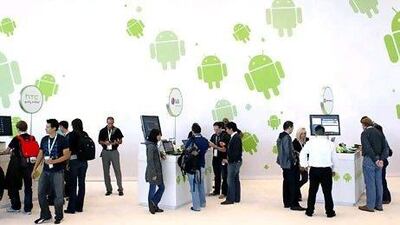The search giant Google is understood to be planning to release its own tablet computers in a move that would take it toe to toe with the Apple iPad and the Amazon Kindle Fire.
Google is expected to use the smartphone and tablet maker Motorola Mobility, which it acquired for US$12.5 billion (Dh45.91bn), to co-brand tablets running Google's Android software to sell online via the Google website. Its strategy is to try to counter what it sees as attempts by rivals such as Apple and Amazon to carve out huge, exclusive chunks of the internet market.
Sergey Brin, a Google co-founder, has accused Apple of restricting internet access by providing a "walled garden" of limited online services in the form of "Apple apps", available to Apple customers via the company's wide range of devices such as the iPhone, the iPad, the iPod touch and Apple TV.
"Google is essentially an advertising company. It develops applications and services to sell advertising space online," says Tony Cripps, an analyst at the research company Ovum. "Google needs to compete in the device space to win eyeballs for its online advertising. Otherwise, it runs the danger of sacrificing that opportunity to rivals such as Apple."
He adds: "Google needs Android, not to so much to sell devices and apps like Apple but more as a canvas for attracting advertisers."
Although Google's Android software is used to power some tablets produced by companies such as Samsung, these devices do relatively little to attract Google's lifeblood of advertising to its website.
Rob Enderle, the principal analyst at the Enderle Group in Silicon Valley, says: "If Google moves into tablets, it likely will kill their licensing efforts, but except for Samsung, they weren't selling that well. [The] issue really is that no one is doing great demand generation, and the Android platform is somewhat of a science experiment, difficult to use and incomplete when compared to Apple's effort."
Google is also concerned that the computer industry's increasing shift to tablets could start to leave it behind once the devices become more widely used - something industry watchers say is happening fast.
According to Forrester, a research company, 55 million iPads were sold in December in the United States alone. But the online retailer Amazon has also carved out a segment of the rapidly growing tablet market. Forrester reports that an estimated 5.5 million Amazon Kindle Fires were sold in the first quarter of this year. Forrester forecasts that tablets will reach a third of the US adult population, 112.5 million US consumers, by 2016.
"Tablets have gained unstoppable momentum," says Sarah Rotman Epps, an analyst for Forrester.
When it launches its tablets, Google will have to decide which end of the market to address. The Apple iPad is more than twice the price of an Amazon Kindle Fire in most markets and Amazon is being credited with gaining access to a vast market of consumers who could not previously afford tablet computers.
As the aim of Google's strategy is to gain access to more loyal consumers, a low price point would be more effective.
"The question is what size screen such a tablet will offer - many observers expect it to offer a seven-inch screen, or thereabouts - and, more important, what its price will be," says Mr Cripps.
There is also a growing view that Google may be forced to play a more direct role in tablet manufacturing as mainstream manufacturers become disappointed with sales of Android tablets in contrast to the success of the Apple iPad and the mushrooming popularity of the Amazon Kindle Fire.
"Doing their own tablet will likely only shift more cost to Google, something that the other OEMs [original equipment manufacturers], in hindsight, might actually prefer, given most seem to be losing their shirts in that segment," says Mr Enderle.
Google has already had one other failed opportunity to address the move away from desktop to mobile computing. Two years ago, the company tried to compete in the smartphone market with the launch of a Google phone, manufactured by HTC, but sales proved disappointing. However, Google appears better placed in the tablet arena.
US customers were the first to embrace tablet computing as companies such as Apple and Amazon prefer to release new devices first in North America. But there is now dramatic new evidence that the lucrative US market for computers may only be the tip of a truly immense global market.
A Forrester survey of 9,912 technology users at small and medium enterprises in 17 countries reports that workers in Brazil, Russia, India and China, along with Mexico, lead the demand fortabletsat work. Another factor is that workers in those countries are willing to share with their employers the cost of acquiring tablet computers.
But Google must address this huge market successfully, and soon, to ensure enough new eyeballs on its website to meet future advertising revenue predictions.

